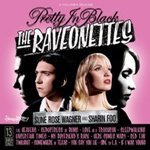
Raveonettes Pretty In Black
(Columbia)
I've always found it quite hard to admit to people quite how much I like the first two Raveonettes albums. To be honest, it makes me feel quite dirty talking about it in public at this very moment. Not that I'm ashamed of owning them, far from it in fact. Whip It On and Chain Gang Of Love are two great examples of minor and major-key pop respectively, encompassing all that was (is) good about the Jesus And Mary Chain and 60's girl groups. It's just that there is something about The Raveonettes sound that's just so, well, filthy. Listening to Sune Rose Wagner & Sharin Foo's duelling, whispered vocals over the course of a whole album is enough to make me feel compelled to take a cold shower. It's like Twin Peaks meets American Graffiti, only slightly more unsettling.
But what of the third album? Well, it's certainly a relief that The Raveonettes have chosen to ditch the rigid set of rules regarding key and tunings that they must have deemed to have come to it's logical conclusion, and have embraced the concept and the challenge of writing what could be described as the perfect pop album for the 21st century. And the scary truth of the matter is that for the most part of Pretty In Black they've succeeded. Album opener The Heavens is a beautiful, understated gem of a track, and sounds like a dusty and unappreciated cowboy country record that's only just been discovered at the back of someone's attic, whilst Love In A Trashcan is the kind of beautifully trashy record that has benefited from Sune & Sharin's newfound love of light and shade, sounding like a sleazy midnight tryst in a Technicolor paradise.
Perhaps the most beautiful element of Pretty In Black is the fact that the band have taken their obvious reference points on record and have embraced them, rather than choosing to hide them under squalling feedback as they have on previous efforts. Echoes of acts such as Brian Wilson (Seductress Of Bums), Buddy Holly (album closer If I Was Young) and The Everly Brothers permeate this album without making it sound like a tiresome re-hashing of the past. In fact, one of the standout tracks on the album, Here Comes Mary, sounds so much like All I Have to Do Is Dream by The Everly's that it borders on outright plagiarism, but the track is rescued from rip-off territory by sounding like a lament to a love lost rather than the saccharine ballad it borrows from so heavily.
All this praise, and I still haven't mentioned the finest track on the album, the Spector-esque feast of sound that is Ode To LA. Featuring a guest spot from Ronnie Spector, the track is bursting with all the energy and fire of a classic pop record, the sort of teenage symphony that songwriters all over the world have wanted to write, but have always been too scared to carry out. It is The Raveonettes finest moment, and arguably one of the best singles I have heard in the past ten years. And that's not a grandiose statement that I've made after one listen. Once you hear it, you'll know what I mean.
Pretty In Black is an album that has the words 'Critics Choice' stamped into every groove. It is an album that has the words 'Hipsters Choice' stamped into every groove too. But to lose this slice of perfect pop to the cool and the elite would be a crime to anyone who has ever had the hairs on the back of their neck put up on end by a pop song or melody. In a time when albums that are considered two-week classics reign supreme, it takes an album like Pretty in Black to make you realise the life affirming power of great pop music. So please sit up and take notice.
24 July, 2005 - 23:00 — Ben Stroud